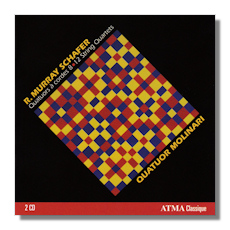
The Internet's Premier Classical Music Source
Related Links
- Schafer Reviews
- Latest Reviews
- More Reviews
-
By Composer
-
Collections
DVD & Blu-ray
Books
Concert Reviews
Articles/Interviews
Software
Audio
Search Amazon
Recommended Links
Site News
 CD Review
CD Review
R. Murray Schafer

String Quartets
- Quartet for Strings #8 (2000/2001)
- Quartet for Strings, Soprano & Taped Children's Voices #9 (2005)
- Quartet for Strings #10 "Winter Birds" (2005)
- Quartet for Strings #11 (2006)
- Quartet for Strings #12 (2013)
Molinari Quartet
Atma ACD2-2672
Canadian Raymond Murray Schafer was born 80 years ago this July. In addition to his work as a composer, he's a writer (his book "The Tuning of the World" is a classic), music educator and environmentalist celebrated for his World Soundscape Project. Given that sweep of activities, you would expect something special and different when picking up a CD (in this case from Atma a two-CD set) of his music, which is in most major genres and is prolific in quantity.
Indeed, previous string quartets (which often have imaginative names or titles… "Parting Wild Horse's Mane") have been written with the addition of soprano (number 4, 1989) and soprano and percussion (number 7, 1998). This set includes string quartets numbers 8 to 12 all played with great style and conviction by the Canadian Molinari Quartet. The quartet was formed in 1997 and has been closely associated with Schafer's chamber works ever since. It's has been described (with justification) a Canada's answer to the Arditti or Kronos quartet. Their mandate is the performance of twentiet-h and twenty-first-century chamber works. As with the other ensembles, their approach is totally in harmony with contemporary and modern developments in the genre. For instance, as with the Ardittis in particular, technical challenges are simply met – with deftness and without fuss – in the service of the music, rather than its newness or novelty. This professional and artistically sound approach pays dividends in that you come away after listening to the music here feeling that the composer has communicated directly with you, rather than that you've been experiencing an "event".
Quartet Number 9 (which also has a part for soprano and taped children's voices) was written in 2005. Its single movement, over 20 minutes long, is elegiac and reflective. But not maudlin. The addition of the taped component (which is always quieter than the instruments) adds a tone of humor (the children are laughing and playing) and delight which could otherwise be rather forced if represented purely musically. It's an odd juxtaposition, perhaps, but not overdone; it works.
Number 10, "Winter Birds" uses a poetic "introduction" (spoken by the composer) to elicit a literal reaction to its northern center of gravity. Since Shafer conjures up the world later in the piece, one is tempted to wonder why he does so – once, briefly and only at the start of the first movement of this five-movement piece. The later writing is certainly atmospheric with many interesting harmonics, glissandi and evocative passages. So is the text really necessary?
The 11th (2006) is also divided into movements. It's based on an eleven-note passacaglia-like theme which the composer dreamt. It too is romantic, evocative and passionate. By this point as you listen to the works on the CDs, you have a good grasp of the ability Shafer has to vary his approach; this is as strong as is his imagination. The 11th also contains a pre-recorded Aeolian harp; and the final bars are very voice-like too.
The second CD contains String Quartets numbers 12 (2012) and 8 (2000/2001) in that order. The 12th illustrates nicely a feature of the composer's (chamber) music – self-reference. It's a single movement work, but contains many turns of mood and tempo affording constant interest. And, like others here, it borrows thematic material from earlier works. This recording co-incides with the work's première performance in May of this year (2013). It's also the most adventurous of the five string quartets here.
The 8th is also a substantial work – at well over 22 minutes. Commissioned by the Molinari Quartet, it celebrates the 50th wedding anniversary of one of the quartet's parents. Accordingly, Shafer adopts a two-part structure. And one which reflects the high spirits of youth paired with mature reflection later. This too has references to birds and birdcalls.
The music of R. Murray Shafer on these CDs, then, makes intriguing listening. It's not particularly challenging, has discernible influences (there are certainly elements of Shostakovich, for example), breaks little really new ground; yet the ground which it does cover is fertile and pleasant. The Molinaris know the composer's priorities and strengths well. Well enough, indeed, to make persuasive ambassadors for it in every way. Their technique, almost needless to say, is sound and admirable.
This is a worthwhile and wholly satisfying CD set of music that isn't recorded and available elsewhere. Apart from being attractively priced by Atma, it's a set that's well presented. The variety of acoustics which have been used focuses attention on the instruments (and voices; the mixing is good) as it should. The booklet introduces the composer's chamber output, each work and the Molinaris. If you have R. Murray Shafer's Quartets 1 to 7 (on Atma Classique ACD2-2188/89), you'll surely want to add this set. If the composer, his work and/or the use which he makes of the medium intrigue you, you won't find this release lacking. It's not difficult music to listen to. Its experimentalism doesn't reach very far from a largely tonal and relatively conventionally-scored sound world. There's far more variety and substance than there is justified insistence on novelty. But the playing of the Molinaris is melodious, lively, responsive to Shafer's intents; it's not dazzling, but doesn't lack just the right amount of virtuosity when called for. Well worth a listen.
Copyright © 2013, Mark Sealey




















